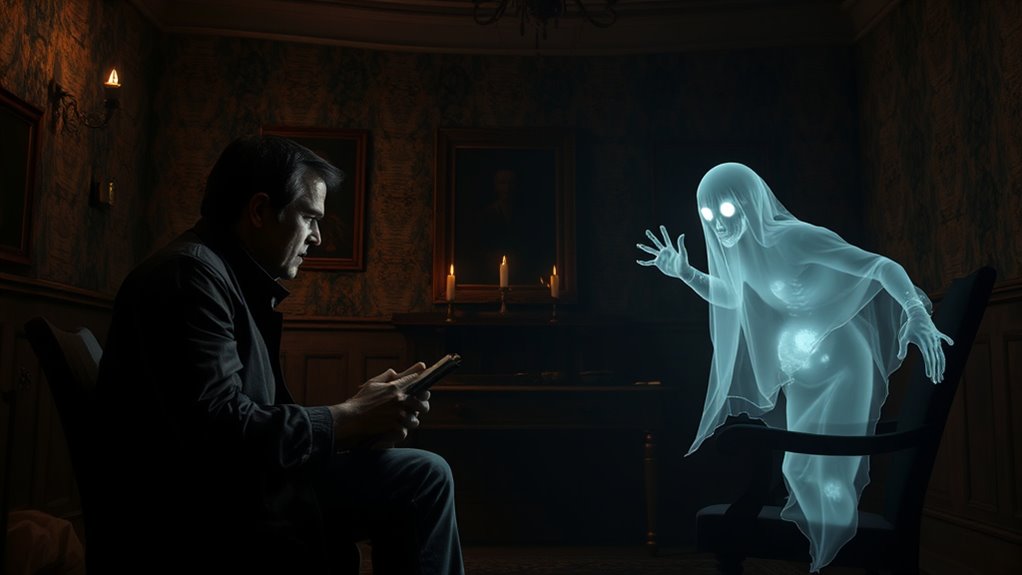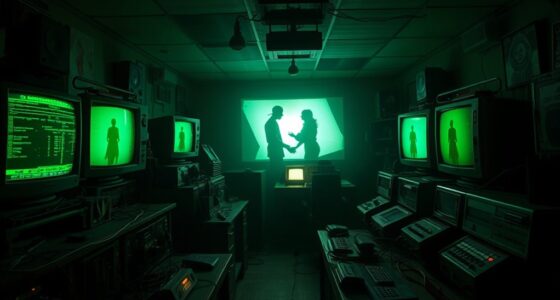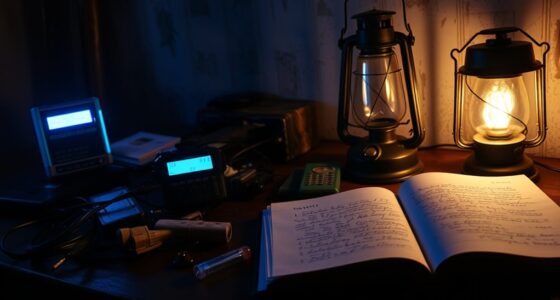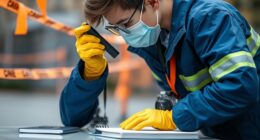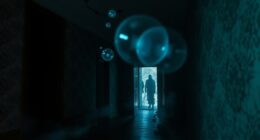When interviewing a ghost witness, ask open-ended questions to encourage detailed descriptions while observing their emotional state and any emphasized details. Be mindful of how perceptions can be influenced by lighting, noise, and their personal beliefs or fears. Avoid leading questions to prevent shaping their responses. Remember, memories can be fluid and affected by external factors. Continuing further will help you understand how perception and external influences shape these accounts more deeply.
Key Takeaways
- Use open-ended questions to encourage detailed, personal descriptions of the sighting.
- Observe emotional cues and sensory details to gauge perception influences and credibility.
- inquire about environmental factors like lighting or noise that may have affected perception.
- Be aware of psychological suggestibility and cultural influences that might shape the account.
- Document accounts thoroughly while maintaining empathy and skepticism to assess reliability.
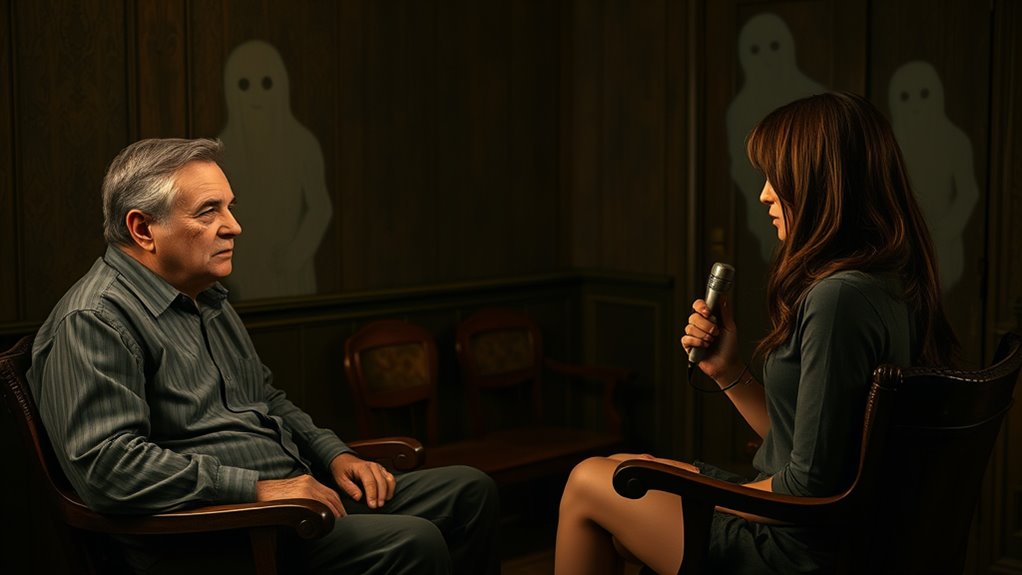
Throughout history, countless people have claimed to see ghosts, sharing their eyewitness accounts of encounters that defy explanation. When you interview someone who believes they’ve seen a ghost, you tap into a complex web of eyewitness psychology that influences how they perceive and recall their experience. Your goal is to gather authentic accounts, but you also need to understand how their memories and perceptions shape their stories. The human mind can be remarkably suggestible, especially when someone is convinced they’ve encountered something supernatural. This means that what they report as paranormal evidence may be influenced by their beliefs, fears, or expectations. Recognizing this helps you approach these accounts with a balanced perspective, neither dismissing nor blindly accepting what’s shared.
To effectively interview a ghost witness, you should ask open-ended questions that encourage detailed descriptions. Instead of leading them with assumptions, allow them to describe their experience in their own words. Pay attention to their emotional state and the details they emphasize, as these can reveal how their psychological processes influence their memory. You might inquire about what they saw, heard, or felt, and whether they experienced any physical sensations. Many witnesses recall vivid visual or auditory details, but it’s crucial to consider how eyewitness psychology might color these memories—perhaps through suggestibility or prior beliefs about ghosts. Additionally, understanding the role of visual perception**** can help interpret how sensory information is processed during such encounters. It’s also important to consider how environmental factors like lighting or noise could affect their perception and memory of the event.
As the interview progresses, look for consistency in their story. Fluctuations or contradictions don’t automatically invalidate their account but highlight how memory and perception can be fluid. It’s also helpful to explore whether they have had similar experiences before, as prior experiences can influence current perceptions and enhance suggestibility. It’s also beneficial to consider the influence of cultural background on their interpretation of paranormal encounters, as personal beliefs often shape perception. It’s also helpful to explore their environment at the time of the encounter—lighting, noise, and emotional state all play a role in how they interpret their surroundings. Remember that paranormal evidence isn’t just about what was seen or heard but also about how the witness perceives and contextualizes the event. Sometimes, a person’s cultural background or personal experiences can influence how they interpret ambiguous stimuli.
Ultimately, your role is to document their account thoroughly while remaining aware of the psychological factors at play. This balanced approach allows you to collect credible testimony without falling prey to biases or assumptions. By understanding eyewitness psychology, you can better assess the reliability of their story and identify potential influences on their perception. Whether you’re seeking genuine paranormal evidence or trying to understand the human mind’s role in these accounts, your careful, empathetic interviewing skills are essential for uncovering the truth behind ghost sightings. Recognizing how perception can be shaped by external factors is key to interpreting eyewitness reports objectively.
Frequently Asked Questions
How Do You Verify the Accuracy of Ghost Eyewitness Reports?
When verifying the accuracy of ghost eyewitness reports, you focus on evidence analysis and interview techniques. You should carefully analyze the details provided, looking for consistency and plausibility. Use open-ended questions to encourage honest responses and observe body language for credibility. Cross-reference accounts with any available physical evidence or environmental factors. This thorough approach helps you determine if the witness’s story aligns with the facts and supports the overall investigation.
What Psychological Factors Influence Ghost Eyewitness Testimonies?
When exploring ghost eyewitness testimonies, you should consider how psychological factors influence reports. Memory distortion can cause witnesses to unintentionally alter details over time, and confirmation bias might lead them to interpret ambiguous stimuli as ghostly. These factors shape their perceptions, making their accounts more reflective of their mental state than actual supernatural events. Recognizing these influences helps you better understand the reliability and limitations of ghost witness statements.
Are There Common Locations Where Ghost Sightings Frequently Occur?
Imagine visiting a famously haunted house like the Winchester Mystery House; such locations are known for frequent ghost sightings. Haunted locations and popular sites often attract many eyewitnesses, drawn by curiosity or folklore. These sites typically have a history of paranormal activity, making them prime spots for ghost encounters. You’ll find that many reports cluster around these areas, reinforcing their reputation as hotspots for paranormal activity.
How Do Cultural Beliefs Shape Ghost Eyewitness Accounts?
You see, cultural beliefs greatly influence ghost eyewitness accounts. Your cultural narratives and belief systems shape how you interpret strange experiences, often attributing sightings to spirits or supernatural forces aligned with your traditions. When you hear stories from different cultures, you’ll notice diverse descriptions and explanations, reflecting their unique perspectives on the afterlife. These beliefs guide your perceptions, making your eyewitness accounts deeply rooted in the cultural context you belong to.
What Challenges Do Interviewers Face When Collecting Ghost Testimonies?
You face challenges when collecting ghost testimonies, balancing memory biases and emotional influences. Memory biases can distort details, making it hard to verify accounts, while emotional influences may heighten or diminish perceptions. You must navigate these hurdles carefully, questioning witnesses patiently and critically, to uncover genuine experiences. By understanding these challenges, you can better assess the credibility of accounts, ensuring your investigation remains thorough and objective despite the complexities involved.
Conclusion
As you wrap up your interview, remember that studies show around 60% of people claim to have experienced a ghostly encounter at some point. Your firsthand account adds valuable insight to this mysterious phenomenon. By listening carefully and asking open-ended questions, you help uncover stories that might otherwise go unheard. Keep an open mind—you never know when your next interview might reveal the most compelling ghost story yet.
